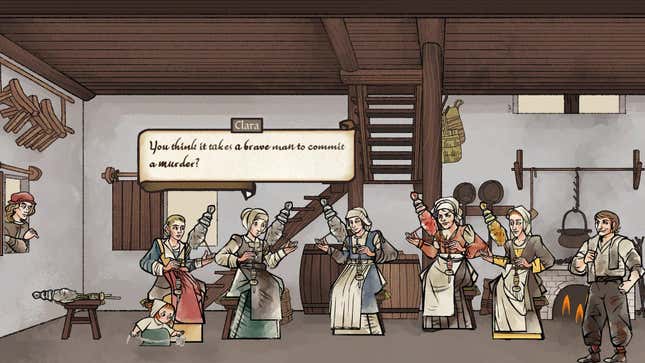Obsidian Entertainment, the developer responsible for sprawling RPGs likeFallout: New Vegas, released its medieval murder mystery title Pentiment in November 2022. A smaller and more reserved title compared to the rest of Obsidian’s catalog, and an expertly written story that offers the player choices in how they navigate an intricately designed Bavarian town and the murders happening in it. It’s a game that takes risks and that, according to director Josh Sawyer, wouldn’t exist without Game Pass alleviating the need to make a profit on direct sales of the game. While Pentiment was received well by critics, it was overshadowed by bigger releases like God of War Ragnarok. But now, thanks to Xbox releasing the game on PlayStation and Nintendo Switch starting today, nobody has an excuse not to play this underrated gem.
Pentiment on PlayStation and Switch is a must-play
Set during the 16th century in the fictional town of Tassing, Bavaria, Pentiment follows the life of artist Andreas Maler across 25 years of his life. You guide Andreas through chatting with neighbors, illustrating manuscripts, or exploring the hidden secrets of Tassing and the Benedictine abbey that stands above it, becoming immersed in the lives of everyone in the town. Pentiment is slow to start, meandering through the opening by making the player spend time chatting with the locals without any real goal. That is until a murder occurs at the abbey.

While Andreas is not a detective by trade, his desire to prove the innocence of his accused friend drives him to search for answers about the murder. This is where Obsidian’s penchant for player choice comes into play. Andreas is not a blank slate, but at the beginning of Pentiment the player is able to choose the details of his life. Where did he study abroad? What subjects did he focus on? Did he like to party into the evening? These decisions give Andreas certain attributes that will unlock new paths and dialogue options. Each of these could be helpful in discovering a clue to the identity of the murderer.
In simple terms, Pentiment is a game about talking to people. A lot. The opening, somewhat meandering hours full of conversation are an indicator of just how important talking is in this game. And once lives are on the line, everything the inhabitants of Tassing and its abbey say becomes dripping with importance. You may learn about old grudges between neighbors, or that a priest is spending his evenings slipping away to study the occult. Not everything you find is relevant to the murder, but it paints an elaborate tapestry of the town’s complex relationships. And any bit of information could be what leads you to the murderer. Pentiment is entirely focused on people and how they interact with each other, especially through the spoken and written word. The game’s dialogue boxes use different fonts to tell you more about the character speaking— Commoner’s speech is handwritten scratch, a priest’s lines are written in gorgeous calligraphy. There are even those who speak in printed font, to mark the historical transition to the printing press.
Pentiment’s choice to take place over 25 years shows how people and places change, and how memory is forgotten or preserved. Andreas’s multiple visits to the town of Tassing show how his (and by extension the player’s) choices have had an impact on the inhabitants. A murder victim may be remembered as someone they were not, and an accused may now be hated despite once being an upstanding pillar of the community. What is even more ingenious is Pentiment’s choice to never tell you if you picked the correct culprit for the murder. You and Andreas must live with uncertainty. Pentiment accomplishes its stunning narrative about justice and memory thanks to its smart mechanics and literary tone. It is an achievement of video game narrative and now that it’s on every major platform, you owe it to yourself to experience it.

